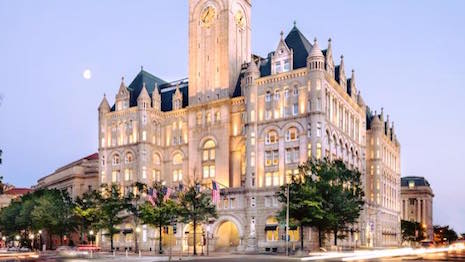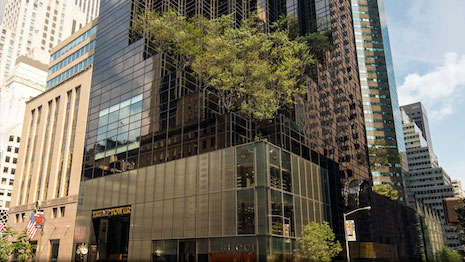- About
- Subscribe Now
- New York,
October 23, 2018

 Trump International Hotel in Washington. Image credit: Trump Hotels
Trump International Hotel in Washington. Image credit: Trump Hotels
Almost two years into his time in office, President Donald Trump’s political brand is weakening his retail brand in categories such as real estate, according to a new report.
A survey conducted by Brand Keys found that consumers today feel the Trump name adds less value to products than they did in December 2017. Right after the election, the Trump brand appeared to have been given a boost (see story), but the attempt to balance the political and the personal is challenging the human brand Mr. Trump established decades ago.
“For 30 years Mr. Trump had been one of the most powerful brands we’ve tracked,” said Robert Passikoff, president of Brand Keys. “We’re hesitant to call him a ‘brand’ anymore, not in the traditional marketing sense of the word, anyway.
“Brands operate differently in the political arena than they do in the consumer marketplace and it’s difficult for one brand to operate successfully in both simultaneously,” he said.
In September, Brand Keys surveyed 1,500 U.S. consumers across political parties from nine Census regions.
Trump trajectory
“Prior to his election, and even shortly thereafter, you could add the Trump name to virtually anything and the perceived value of the product would increase upwards of 30 percent,” Mr. Passikoff said. “The most celebrated of celebrities generally adds 12 to 15 percent value to products or services to which they lend their names.
“Trump was a superstar,” he said. “But not any more.”
The areas where the Trump brand adds the most value today is country clubs and golf clubs and hotels. Both of these categories see about a 50 percent value added from the Trump name.
Apparel, meanwhile, has dwindled, with an added value of 1 to 2 percent for categories such as dress shirts and ties.
Brand Keys noted that before his presidential campaign, Mr. Trump’s name was being licensed to about 20 companies who wished to be associated with attributes such as “luxury” and “wealth.”
 Trump Tower in midtown Manhattan. Image credit: Trump International Realty
Trump Tower in midtown Manhattan. Image credit: Trump International Realty
“Whether Mr. Trump is currently involved in all these categories or not, the significant decline in the perception of his added brand value is a harbinger of the strength of the Trump brand,” Mr. Passikoff said. “The only categories currently holding up are country clubs and hotels, most of which are monetized more by political pull and presidential access, á la the GOP and evangelical Christian groups, than brand pull.”
A number of hotels opted to cut ties with the brand in recent years, removing the Trump name from their façades (see story).
In December 2017, real estate with the Trump name had an added value of 55 percent. Today, the brand only adds a 40 percent bump.
President Trump’s polarizing political career appears to be impacting his namesake real estate brand, according to recent data from CityRealty.
In 2017, sales of Trump-branded condos in New York fell below the average prices for all Manhattan condos for the first time. While some of the decline can be attributed to a saturated market, the overall downward trend of Trump International Realty properties this past year also points to an effect from the presidency (see story).
Share your thoughts. Click here